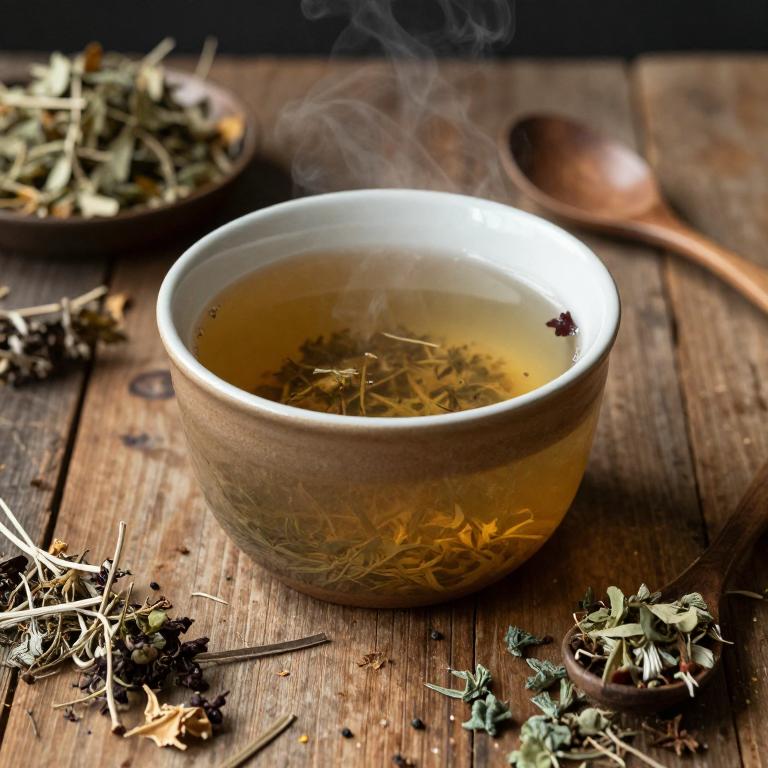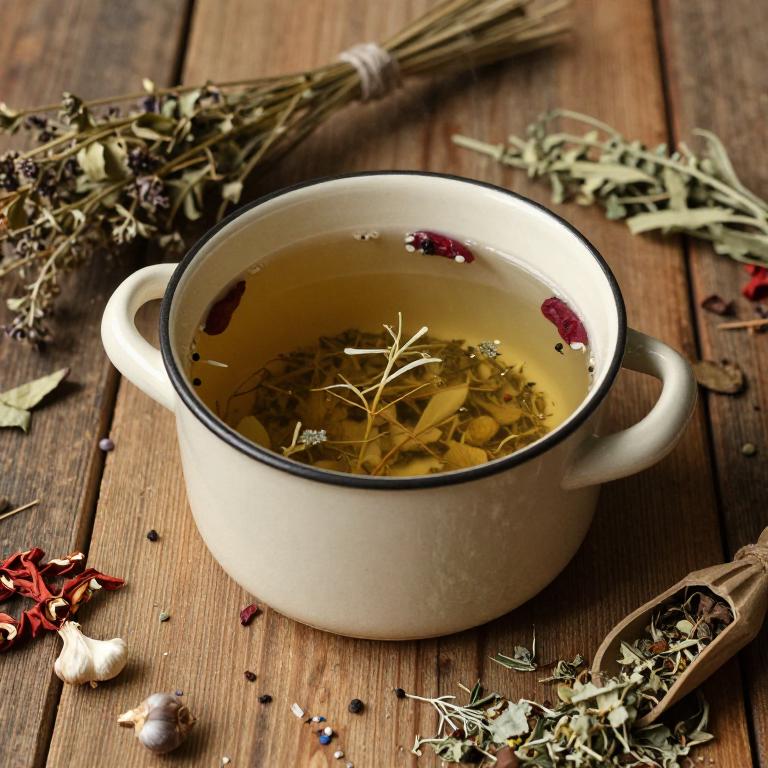10 Best Herbal Decoctions For Cough

Herbal decoctions have been traditionally used to alleviate cough symptoms by harnessing the medicinal properties of various plants.
Common herbs such as licorice root, eucalyptus, and ginger are often included in these preparations due to their anti-inflammatory, expectorant, and soothing effects. To prepare a decoction, the herbs are typically simmered in water for an extended period to extract their active compounds. This method allows for the gentle release of beneficial compounds that can help reduce irritation in the throat and loosen mucus.
While herbal decoctions can be a natural remedy for coughs, it is advisable to consult a healthcare professional, especially for persistent or severe symptoms.
Table of Contents
- 1. Eucalyptus (Eucalyptus globulus)
- 2. Thyme (Thymus vulgaris)
- 3. Ginger (Zingiber officinale)
- 4. Fennel (Foeniculum vulgare)
- 5. Peppermint (Mentha piperita)
- 6. Chaste tree (Vitex agnus-castus)
- 7. Rosemary (Rosmarinus officinalis)
- 8. Ceylon cinnamon (Cinnamomum verum)
- 9. Salvia (Salvia officinalis)
- 10. Chamomile (Matricaria chamomilla)
1. Eucalyptus (Eucalyptus globulus)

Eucalyptus globulus, commonly known as the Australian eucalyptus, is often used in herbal decoctions to alleviate symptoms of cough due to its expectorant and anti-inflammatory properties.
The leaves of this plant contain compounds such as eucalyptol, which help to loosen mucus and reduce respiratory congestion. To prepare a herbal decoction, the dried leaves are typically simmered in water for several minutes, allowing the active ingredients to dissolve into the liquid. This remedy is particularly effective for dry or productive coughs associated with colds or bronchitis.
However, it is important to consult a healthcare professional before using eucalyptus globulus, especially for individuals with asthma or those taking medications, to avoid potential interactions or adverse effects.
2. Thyme (Thymus vulgaris)

Thymus vulgaris, commonly known as thyme, has been traditionally used in herbal medicine for its potential benefits in treating respiratory conditions, including cough.
The herbal decoctions of thyme are prepared by boiling the dried leaves and flowers in water to extract its active compounds, such as thymol and carvacrol, which possess antimicrobial and expectorant properties. These compounds help to loosen mucus and reduce inflammation in the respiratory tract, making thyme decoctions effective in alleviating symptoms of both dry and productive coughs. Additionally, thyme is often combined with other herbs like licorice or eucalyptus to enhance its therapeutic effects.
While generally safe when used in moderate amounts, it is advisable to consult a healthcare professional before using thyme decoctions, especially for prolonged periods or in individuals with known allergies or medical conditions.
3. Ginger (Zingiber officinale)

Zingiber officinale, commonly known as ginger, has been widely used in traditional medicine for its potential therapeutic effects on respiratory conditions, including cough.
Herbal decoctions made from fresh or dried ginger root are often prepared by simmering the root in water to extract its active compounds, such as gingerol and shogaol, which possess anti-inflammatory and antitussive properties. These decoctions are believed to help soothe irritated throats, reduce mucus production, and alleviate the frequency and intensity of coughing. In many cultures, ginger tea is a popular home remedy for both dry and productive coughs, often combined with honey or lemon for enhanced flavor and additional soothing effects.
While research supports ginger's role in managing cough symptoms, it is advisable to consult a healthcare professional before using it as a treatment, especially for persistent or severe respiratory issues.
4. Fennel (Foeniculum vulgare)

Foeniculum vulgare, commonly known as fennel, has been traditionally used in herbal medicine to alleviate cough symptoms due to its expectorant and antispasmodic properties.
A decoction of fennel seeds or leaves can be prepared by simmering the dried plant material in water for about 10 to 15 minutes, allowing the active compounds such as anethol and fenchone to be extracted. This herbal preparation is often consumed as a warm tea to soothe irritated throats and loosen mucus, making it easier to expel. Fennel decoctions are particularly beneficial for dry, irritating coughs and are considered safe for most adults when used in moderation.
However, it is advisable to consult a healthcare professional before use, especially for individuals with existing medical conditions or those taking medications.
5. Peppermint (Mentha piperita)

Mentha piperita, commonly known as peppermint, is often used in herbal decoctions to alleviate cough symptoms due to its expectorant and soothing properties.
The preparation involves steeping fresh or dried peppermint leaves in hot water to create a calming herbal tea. This decoction can help reduce throat irritation and loosen mucus, making it easier to expel. Peppermint's menthol content also provides a cooling effect that can ease the sensation of coughing.
However, it is important to consult a healthcare provider before using peppermint decoctions, especially for children or individuals with certain health conditions.
6. Chaste tree (Vitex agnus-castus)

Vitex agnus-castus, commonly known as chasteberry, is traditionally used in herbal medicine for its potential therapeutic properties.
While it is more commonly associated with hormonal balance and menstrual regulation, some herbalists suggest it may have mild expectorant properties that could support respiratory health. However, there is limited scientific evidence specifically linking vitex agnus-castus to the treatment of coughs. Herbal decoctions made from vitex are typically prepared by simmering the dried fruits in water, and may be combined with other herbs to enhance their effects.
Despite its traditional use, it is important to consult a healthcare professional before using vitex for coughs, as its efficacy and safety for this purpose require further research.
7. Rosemary (Rosmarinus officinalis)

Rosmarinus officinalis, commonly known as rosemary, has been traditionally used in herbal decoctions to alleviate symptoms of cough due to its antimicrobial and anti-inflammatory properties.
When prepared as a decoction, rosemary leaves are simmered in water to extract their essential oils and bioactive compounds, such as rosmarinic acid and camphor. This herbal remedy is believed to help soothe irritated airways and reduce mucus production, making it beneficial for both dry and productive coughs. However, it is important to use rosemary decoctions in moderation, as excessive consumption may cause gastrointestinal discomfort or interact with certain medications.
Overall, rosemary decoctions offer a natural and aromatic alternative for those seeking relief from cough symptoms through traditional herbal means.
8. Ceylon cinnamon (Cinnamomum verum)

Cinnamomum verum, also known as true cinnamon, has been traditionally used in herbal medicine for its soothing properties, particularly in the treatment of coughs.
The bark of the tree is often prepared as a decoction by simmering the dried inner bark in water, which releases essential oils and compounds like eugenol and cinnamic acid. These compounds are believed to have anti-inflammatory and antispasmodic effects that may help reduce irritation in the respiratory tract and ease coughing. Herbal decoctions made from Cinnamomum verum are commonly used in combination with other herbs such as licorice or ginger to enhance their therapeutic effects.
However, it is important to consult a healthcare professional before using cinnamon decoctions, especially for prolonged periods or in individuals with certain medical conditions.
9. Salvia (Salvia officinalis)

Salvia officinalis, commonly known as sage, has been traditionally used in herbal medicine for its soothing properties, particularly in the treatment of coughs.
Herbal decoctions made from the leaves of salvia officinalis are prepared by simmering the dried leaves in water to extract their active compounds, which include flavonoids and essential oils. These compounds are believed to have antiseptic and anti-inflammatory effects that can help reduce throat irritation and loosen mucus in the respiratory tract. Sage decoctions are often recommended for dry or productive coughs and are sometimes combined with other herbs like thyme or licorice for enhanced efficacy.
However, it is important to consult a healthcare professional before using sage decoctions, especially for prolonged periods or in individuals with certain medical conditions.
10. Chamomile (Matricaria chamomilla)

Matricaria chamomilla, commonly known as chamomile, has been traditionally used in herbal medicine for its soothing properties.
Chamomile herbal decoctions are often prepared by steeping the dried flowers in hot water, creating a calming tea. These decoctions are believed to help alleviate symptoms of coughs by reducing inflammation and soothing irritated throats. The active compounds, such as flavonoids and bisabolol, may contribute to its expectorant and antispasmodic effects.
While generally safe, it is advisable to consult a healthcare professional before using chamomile decoctions, especially for prolonged or chronic cough conditions.